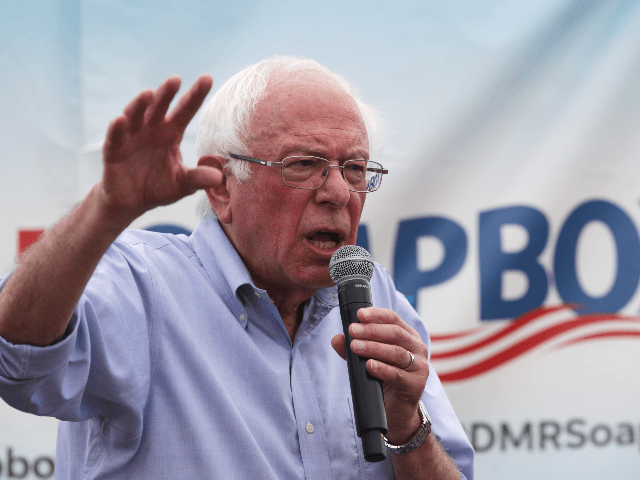Democratic presidential hopeful Sen. Bernie Sanders (D-VT) shared his ideas for criminal justice reform on Sunday, calling for the end to cash bail and claiming that “hundreds of thousands” of people are in U.S. prisons “convicted of nothing.”
Sanders was one of the candidates who spoke at the Young Leaders Conference in Atlanta this weekend and National Public Radio (NPR) asked what he said to “thousands of black millennials.”
“You’d end cash bail,” Weekend Edition host Lulu Garcia-Navarro said in the interview.
Sanders said the criminal justice system is “deeply, deeply, deeply broken” and that the United States spends $80 billion a year to “lock-up over two million Americans” and that prevention rather than punishment should be the priority.
And he said “hundreds of thousands” of people are behind bars because they are poor.
“We have an insane system, which I think not many people are aware of, that, Lulu, today, 20 percent of the people who are in jail at this moment, their crime is they are poor,” Sanders said. “They have been convicted of nothing. They are in jail because they cannot afford cash bail.”
“And I think people are listening to this, like, that can’t be true. Do you mean that we have hundreds of thousands of people in jail right now who have been convicted of nothing?” Sanders said. “Yes, that’s right, convicted of nothing. But they cannot afford the … five hundred dollars or the $1,000 they need for cash bail.”
Garcia-Navarro asked about his plan to pull federal funding from states that won’t end cash bail policies.
“That’s a pretty big stick to use, isn’t it?” Garcia-Navarro asked.
“Well, I think you’re dealing with a very big problem,” Sanders said. “It is hard to imagine that, in the year 2019, we are back in Charles Dickens’ era of debtor prisons. Hundreds of thousands of people in jail right now – why? Because they can’t afford bail; they are poor.”
But data from the federal Bureau of Justice Statistics shows some facts differ from Sanders’ claims in the NPR interview.
A press release from a report released in April 2019 states:
The U.S. prison population was 1.5 million prisoners at year-end 2017, and the population of jail inmates in the U.S. was 745,000 at midyear 2017. There were 1.3 million prisoners under state jurisdiction and 183,000 under federal jurisdiction. From the end of 2016 to the end of 2017, the number of prisoners under federal jurisdiction declined by 6,100 (down 3 percent), while the number of prisoners under state jurisdiction fell by 12,600 (down 1 percent).
The report also states that incarceration rates in the United States are down:
From 2007 to 2017, incarceration rates in both prisons and jails decreased by more than 10%, according to reports released today by the Bureau of Justice Statistics. Over a decade, the incarceration rate among state and federal prisoners sentenced to more than a year dropped by 13 percent, from 506 prisoners per 100,000 U.S. residents in 2007 to 440 prisoners per 100,000 in 2017. The prison incarceration rate also dropped 2.1 percent from 2016 to 2017, bringing it to the lowest level since 1997.
The jail incarceration rate decreased by 12 percent from 2007 to 2017, from 259 to 229 jail inmates per 100,000 U.S. residents, but did not decline from 2016 to 2017.
The report also reveals that the majority of prisoners are behind bars because of violent crimes:
Among state prisoners sentenced to more than one year, more than half (55 percent) were serving a sentence for a violent offense at year-end 2016, the most recent year for which state data are available.
An estimated 60 percent of blacks and Hispanics in state prisons were serving a sentence for a violent offense, compared to 48 percent of whites. At the end of fiscal year 2017, nearly half of all federal prisoners were serving a sentence for drug trafficking.
Garcia-Navarro also asked Sanders if he regretted voting in favor of the 1994 legislation that is blamed for increased incarceration, saying at the time it was a “good compromise.”
Sanders said he knew it was a “bad bill,” but because it included a ban on assault weapons he voted for it.
“What I said is that – on the floor of the House when I voted for that, I knew it was a bad bill, but I made a promise to the people of the state of Vermont that I would vote to ban assault weapons,” Sanders said. “I ran for the United States Congress on that.”
“And it would have been totally hypocritical of me to suddenly not vote for that legislation as bad as it was,” Sanders said.
Follow Penny Starr on Twitter

COMMENTS
Please let us know if you're having issues with commenting.